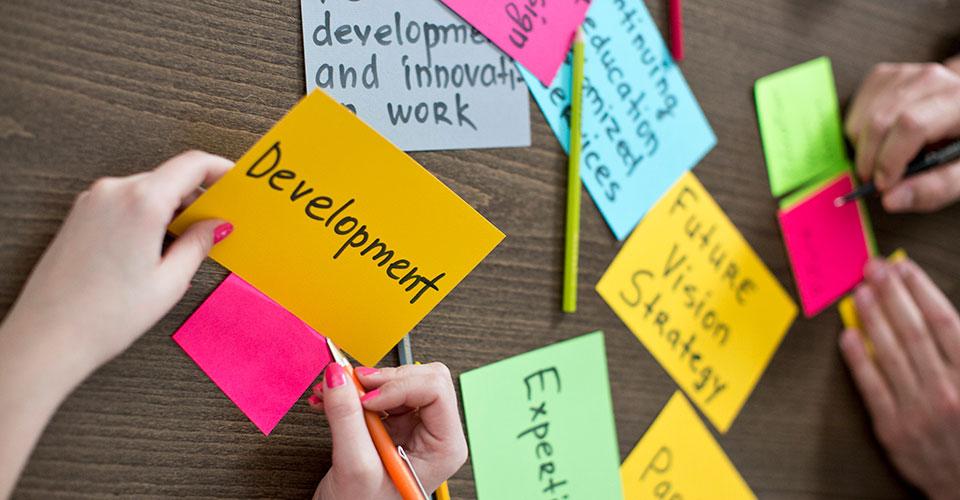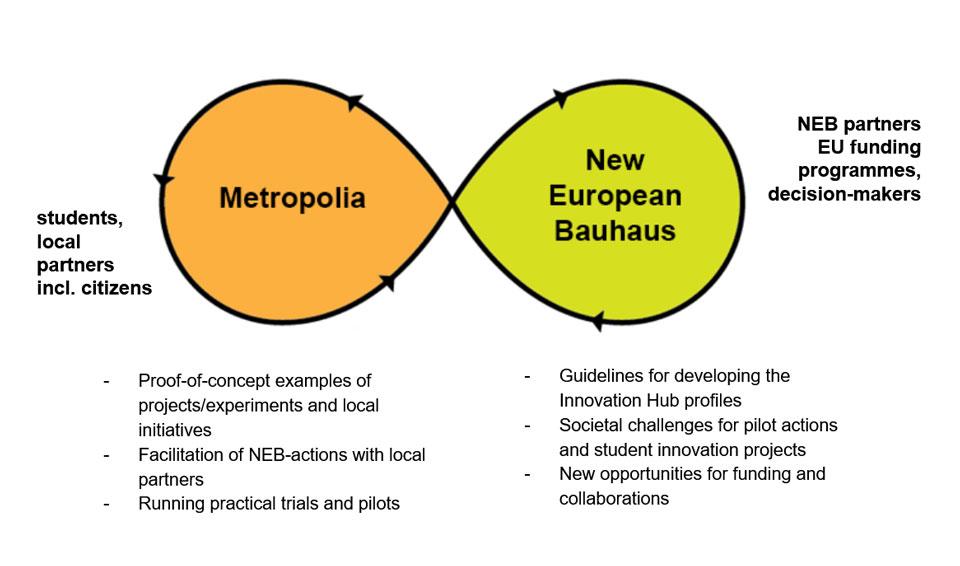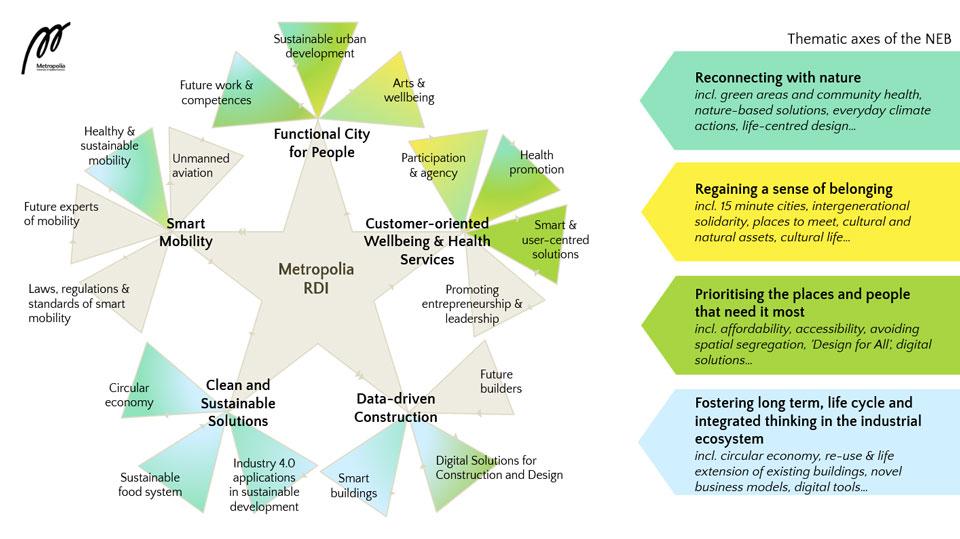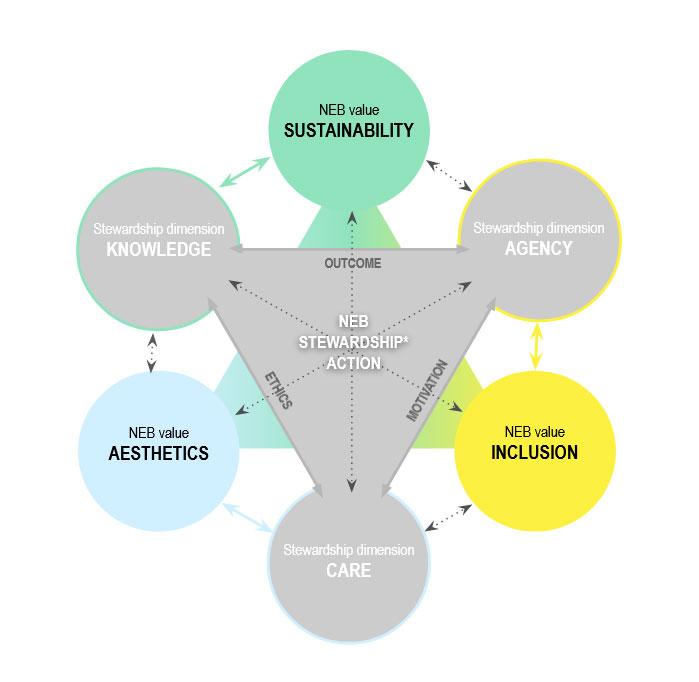
Päivi Keränen
The RDI activities of Metropolia University of Applied Sciences can be characterised as problem-based, transdisciplinary and solution-oriented, aiming to contribute to a fair sustainability transition in society. While the focus has been on the contexts of the urban Helsinki region, international collaboration is increasingly important. Together with cities and stakeholders, the staff and students of Metropolia have conducted projects related to design-based participatory urban planning and development since 2012, the year in which Helsinki was the World Design Capital. Gradually, these projects and networks have grown from local to international, while the themes have varied from sustainable urban mobility (Design for Everyday Mobility 2011–2016) and campus development (e.g. Live Baltic Campus 2015–2018) to testing novel extended reality applications for enhancing public participation in planning (Augmented Urbans 2018–2022).
This ambition has guided Metropolia to become the first Finnish UAS to join as a partner in the European Commission’s New European Bauhaus (NEB) initiative, which aspires to translate the European Green Deal into a tangible and positive experience for all Europeans to participate in and progress in together (European Commission 2021, 2019). The pan-European initiative seeks to facilitate societal transformation along three inseparable values: sustainability, aesthetics and inclusion. It also aims to harness creative minds and methods to lead transdisciplinary collaborations to co-create future living environments, aligning well with Metropolia’s strategy and RDI expertise (Huhtaniemi et al. 2021).
This article shares the progress and insights gained from collaboration with the international NEB partner network and the European Commission thus far and describes how these have been reflected internally at Metropolia. Much like the NEB initiative, the process has been organic—testing different approaches and actively grasping opportunities as they arise. The actions address three principles of NEB, namely combining global and local dimensions, participation and transdisciplinarity, although at Metropolia the emphasis is currently on combining European and local levels.
A shared framework and call for practical co-action – an opportunity for the UAS
Unlike most EU initiatives, NEB started with co-design, inviting citizens and organisations across Europe to share their ideas, concerns and views about the future living environments. Now in the delivery phase, an essential aspect of NEB is its community of partners, friends (for-profit organisations and public bodies interested in NEB), and prize-winners, forming a sounding board and expert network. The cross-cutting initiative spans multiple EU funding instruments and utilises a participatory bottom-up approach to include its partners and stakeholders in European policy development. In the NEB initiative, Metropolia recognised an opportunity to learn from the other NEB partners, to share locally developed insights with them (Fig. 2), and, ultimately, to form new co-actions based on this interaction.

The outline of the four thematic axes of the initiative in the European Commission communication (2021) allowed more in-depth mapping of relevant skills, expertise and interests embedded in the Metropolia community (Fig. 2). The mapping provides a basis to identify pertinent RDI topics and helps link international enquiries and other opportunities to specific Metropolia experts. It also revealed a vast potential for transdisciplinary collaboration and joint student projects within Metropolia concerning NEB.

Collaboration with cities is crucial to implementing NEB and provides excellent learning opportunities. As one of the first NEB-related student challenges, multidisciplinary student teams designed concepts for the City of Espoo to envision the streets of the future and the solutions needed for them. Together with Espoo, Metropolia also co-organised sessions on NEB at the Finnish Urban Studies Days and Eurocities conference 2022.
Becoming more visible and proactive on the EU level
As a bottom-up initiative, NEB aims to provide an equal opportunity for different backgrounds to contribute to European policy discussions. Being a part of the NEB initiative has opened opportunities to share insights and project results in international forums, such as the NEB Festival. In June 2022, the NEB Fair selected the Augmented Urbans project as one of the exhibitors at the primary event site in Brussels (Fig. 3). To boost the networking opportunities, Metropolia, in collaboration with the national NEB contact point Archinfo, the Association of Finnish Municipalities and the Helsinki EU Office, organised an informal meeting for the Finnish NEB partners and enthusiasts.

The insights from past projects have also aided Metropolia in developing its specific approach to the initiative: NEB Stewardship combines the sustainability science concept of stewardship with the aspirational NEB values to make them more tangible (Fig. 4) (Keränen 2022).

In sustainability science, stewardship refers to the active shaping of trajectories of social-ecological change to support resilience and human well-being (West et al. 2018), which, in essence, also depicts the core aim of the NEB initiative. Adding the stewardship dimensions of knowledge, agency and care (e.g. Andersson et al. 2017, Enqvist et al. 2018) to complement the NEB values draws attention to the capacities needed for effective individual and collective actions pursuing sustainability. At the same time, the NEB values describe the aspired characteristics of both the development process and its outcomes. The RDI-integrated learning that is prominent at Metropolia offers an excellent basis for nurturing NEB stewardship by providing students and stakeholders practical experiences in how to contribute to climate action with their growing professional skill set.
NEB Stewardship Lab aims for international knowledge accumulation and local application
While NEB currently has over one hundred higher education partners, their role is still being shaped. To spark dialogue on the changing role of universities in the Anthropocene, Metropolia proposed a dedicated NEB Lab project based upon the NEB Stewardship (NEB-S) concept. In the NEB Lab, teams self-organise projects to achieve tangible change in a specific context and receive support in communication, secretariat and mentoring from the European Commission to establish the needed operational resources.
The NEB Stewardship Lab proposed by Metropolia aims to examine, clarify and enhance the role of higher education in the NEB initiative via co-developing the NEB-S model, and it facilitates knowledge accumulation and exchange to apply the model in different contexts. The NEB-S Lab members share an interest in exploring the actor-level aspects—which universities have an excellent opportunity to address—in the realisation of the NEB initiative through stewardship dimensions. Universities thrive on accumulating knowledge, but simultaneously promoting agency and care, in particular, can provide novel perspectives. The overarching purpose is to make NEB more accessible and tangible for the students and to nurture their transition from climate anxiety to NEB stewardship.
The proposal seems to resonate well with the university partners of NEB. Over forty partners have thus far indicated their curiosity to learn more, almost thirty participated in the info session, and the NEB Lab project received eighteen expressions of interest to join. The next step is ecosystem mapping, which completes the application process to enter the NEB Lab. The aim is to launch the NEB-S Lab in the beginning of 2023.
After the launch, NEB-S Lab members will commence with mapping good practices and case examples of implementing combinations of knowledge, agency and care from their respective universities. The insights collected will guide the members to identify joint research interests and development needs in the NEB-S model. A mid-term presentation will share these with the wider NEB and higher education community while also inviting new contributors to join. Furthermore, NEB-S Lab encourages members to apply the achieved learning points into practice within their respective organisations while organising supportive peer learning sessions. Finally, a delivery workshop will invite members to crystallise lessons learnt and finalise the co-development of the NEB-S working model, potentially paving the way for more network-building activities and project proposals.
NEB-S Lab aims, as much as possible, to embed actions into the regular activities of participating universities, including in their courses and ongoing projects. In Metropolia, the Circular Green Blocks project currently applies the NEB-S model in designing participatory pop-up action with residents to boost the circular and sharing economy at the city block level. Looking forward, the collaboration platforms of Metropolia can provide exciting opportunities for applying NEB-S into practice. These include, for example, the emerging Carbon Garage platform aims to engage students from different disciplines, SMEs and cities to co-learn while developing solutions to capture carbon; the Creative Dimension, just selected to join NEB collaboration in the transformation of places of learning; and the Urban Farm Lab builds a thriving ecosystem for urban food production and technology.
Recommendations
- Select an EU initiative that resonates with the UAS strategy and expertise; identify and link relevant ongoing internal development actions.
- Allow time and resources for co-thinking and communication, and compile a portfolio of the related projects and insights already achieved.
- Communicate internally to enable all interested UAS community members to participate (e.g. via workshops).
- Be proactive and initiate discussions within the international network and with national partners: share your expertise, but also listen and be curious to learn.
- Seize opportunities and act swiftly when an intriguing collaboration opportunity arises (requires allocated time resources).
- Invite students to participate by embedding practical challenges into curricular courses (requires the engagement of lecturers).
Päivi Keränen (MA, PhD candidate), Project manager and theme coordinator of Sustainable urban development at Metropolia UAS, paivi.keranen(at)metropolia.fi
References
Andersson, E., Enqvist, J., & Tengö, M. (2017). Stewardship in urban landscapes. Published in C. Bieling and T. Plieninger, (Eds). The Science and Practice of Landscape Stewardship. Cambridge University Press, Cambridge, UK.
Augmented Urbans – Visionary, Participatory Planning and Integrated Management for Resilient Cities. (n.d.). https://augmentedurbans.metropolia.fi/. Retrieved October 29, 2022
Creative Dimension. (n.d.). Experience the creative dimensions of Arabia Culture Campus. https://luovadimensio.fi/in-english/. Retrieved October 29, 2022
Design for Everyday Mobility? (n.d.). http://lad.metropolia.fi/wp/?page_id=1876. Retrieved October 29, 2022
Enqvist, J. P., West, S., Masterson, V. A., Haider, L. J., Svedin, U., & Tengö, M. (2018). Stewardship as a boundary object for sustainability research: Linking care, knowledge and agency. Landscape and Urban Planning, 179, 17–37.
European Commission (2019). A European Green Deal: Striving to be the first climate-neutral continent. Retrieved October 24, 2022
European Commission (2021). New European Bauhaus: new actions and funding to link sustainability to style and inclusion. Retrieved October 21, 2022
Forum Virium Helsinki. (2022, May 5). Circular Green Blocks bringing sustainable solutions to blocks and housing companies. https://forumvirium.fi/en/projects/circular-green-blocks/. Retrieved October 29, 2022
Huhtaniemi, M., Kahra, P. & Ojala, E. (2021). Metropolian muutoksentekijät kestävän tulevaisuuden rakentajina. UAS journal. vol. 2021, no 4. Retrieved October 29, 2022
Keränen, P. (2022). Stewardship in the New European Bauhaus. Metropolia’s blog ’Tikissä – Tutkimus-, kehitys- ja innovaatiotoiminnan sydämessä’. Retrieved October 24, 2022
Live Baltic Campus. (n.d.). http://livebalticcampus.eu/. Retrieved October 29, 2022
Urban Farm Lab – Urban Indoor Food Platform. (n.d.). Metropolia UAS. https://www.metropolia.fi/en/rdi/collaboration-platforms/urban-farm-lab. Retrieved October 29, 2022
West, S., Haider, L. J., Masterson, V., Enqvist, J. P., Svedin, U., & Tengö, M. (2018). Stewardship, care and relational values. Current opinion in environmental sustainability, 35, 30–38.



